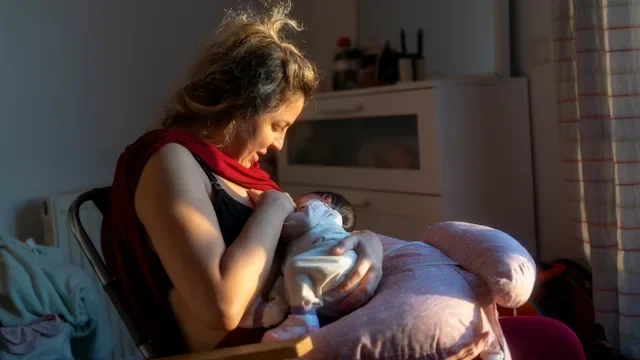Key takeaways:
Crisis pregnancy centers (CPCs) are nonprofit organizations that provide prenatal services and anti-abortion counseling.
Licensed centers can provide medical services, such as ultrasounds and STI testing, but unlicensed centers can’t.
CPCs are criticized for sharing misinformation about abortion, misleading people about their pregnancy options, and offering medical services when unlicensed.
Facing an unplanned pregnancy can be overwhelming. Deciding whether to have the baby or seek an abortion is an incredibly personal decision. And many people’s decisions don’t fit neatly into one category or the other.
It’s important to find a place that will provide accurate and reliable information so you can make the best decision for you. But even taking the first step to find that place is challenging.
In your search for where to go, you may have come across crisis pregnancy centers (CPCs). They are also sometimes called pregnancy resource centers or pregnancy help centers. But what are they? And are they the right place for you?
Search and compare options
We’ll discuss what CPCs are, what they do, and where you can go if they’re not the right resource for you.
What are crisis pregnancy centers, and what is their purpose?
Robert Pearson founded the first CPC in 1967 after abortion became legal. CPCs have always had religious ties and anti-abortion messaging.
Now, roughly 90% of CPCs are operated by three nonprofit organizations:
The National Institute of Family and Life Advocates (NIFLA) has more than 1,600 CPCs across the country. The mission, according to its website, is to “empower abortion-vulnerable women and families to choose life.”
Care Net has more than 1,000 CPCs. Like NIFLA, the purpose of Care Net is to “empower” people to “choose life,” according to its website.
Heartbeat International has more than 3,000 CPC affiliates worldwide. According to its website, it aims to make abortion “unwanted” and “unthinkable.”
Are crisis pregnancy centers successful in stopping abortions?
Possibly, but some research says no.
EKYROS, a religiously affiliated statistics site, tracks the success of 1,600 CPCs nationwide. According to its data, on average, roughly 4% of people who visited a CPC went from wanting to have an abortion to wanting to have the baby. Nearly 40% of people who came to the center already planned to continue their pregnancy.
Katrina Kimport, an associate professor at Advancing New Standards in Reproductive Health (ANSIRH) at the University of California San Francisco, found something similar after interviewing people who visited CPCs.
“Most of the people that I interviewed who had gone to the centers were not actually considering abortion at the time that they went to the centers.” In fact, only 4 of the 21 people Kimport interviewed were considering having an abortion when they went to the center.
What services do crisis pregnancy centers commonly offer?
There are two kinds of CPCs: unlicensed and licensed. Unlicensed CPCs don’t have a medical license and are run by volunteers. They are allowed to offer counseling services and resources, but not medical services.
For example, unlicensed CPCs can give someone a pregnancy test to take. But they can’t diagnose a pregnancy, which is considered a medical service. Despite these rules, unlicensed CPCs have been accused of diagnosing pregnancy, offering other medical services, and posing as licensed medical clinics.
Licensed CPCs are considered medical clinics. They often have a board-certified physician on staff. Becoming licensed allows these clinics to offer services such as ultrasounds and sexually transmitted infection (STI) testing.
Both licensed and unlicensed CPCs can provide intervention counseling. Intervention counseling is designed to stop a pregnant person from seeking an abortion.
Are the services free?
Yes — with caveats. The 21 women Kimport interviewed were able to get free pregnancy tests, prenatal vitamins, maternity clothing, and even car seats.
“For people who were financially struggling… these were tremendously valuable material resources,” Kimport tells GoodRx.
These services were beneficial in the short term. But CPCs can’t address long-term needs such as access to food, housing, and specialized medical care for high-risk pregnancies.
“The centers could not and do not provide sufficient material resources to actually offset the deep need that these women had,” Kimport says.
In Kimport’s research, she also found that free services from CPCs came with strings attached. For example, some CPCs asked women to attend Bible study and watch anti-abortion media to receive services.
Do crisis pregnancy centers offer abortions?
No, CPCs don’t offer abortions. But do they help people find resources that do offer abortions? This can be less clear depending on the organization.
Heartbeat International, for example, is explicit: It will not help people who may want an abortion. The organization’s website states that “Heartbeat affiliates shall not advise, provide, or refer for abortion, abortifacients, or contraceptives.”
Care Net and NIFLA, however, are less direct about not supporting people who may want an abortion. NIFLA states that it will protect life. But it doesn’t mention if it will provide abortion support, such as referrals.
Care Net claims to “provide information about all pregnancy options to clients.” But research suggests that the organization may give false information about the safety of abortion. (Fact: Abortions are very safe.)
Why are crisis pregnancy centers controversial?
If you’ve heard of CPCs, you may know there’s controversy surrounding them. CPCs have been criticized for:
Sharing misinformation about the dangers of abortion: For example, according to the Guttmacher Institute, CPCs falsely tell patients that abortion increases the risk of breast cancer.
Not providing pregnant people with information on how to end their pregnancies: This was the basis of a 2018 lawsuit, National Institute of Family and Life Advocates v. Becerra. A California law (the FACT Act) required licensed CPCs to inform women with low incomes that free or low-cost abortions are available through public programs. CPCs also must provide contact information for these resources. Citing free speech, the court ruled in favor of NIFL.
Disguising unqualified volunteers as clinicians: These volunteers often wear white coats, see women in exam rooms, and provide medical advice.
Not following the Health Insurance Portability and Accountability Act (HIPAA): Unlicensed CPCs are not legally held to the privacy standards of HIPAA, which prevents providers from sharing your private health information. Because of this, CPCs have been accused of actions like contacting a person’s family or employer.
I’m pregnant. Where can I go to learn all of my options?
So you’ve learned you're pregnant. If you’re one of the 32 million people experiencing an unplanned pregnancy, you might feel unsure of your next steps. You have options and resources to help. First, you can call the All-Options hotline for peer support and accurate information. The best option for you will depend on your individual needs and desires:
If you’ve decided to have an abortion and want to find the nearest medical abortion provider, call the National Abortion Federation hotline at 1-877-257-0122. You can also search an online provider database, such as one from Planned Parenthood or IneedanA.com. Keep in mind, states have different laws regarding abortion. You can learn more about abortion laws in your state here.
If you’ve decided to continue your pregnancy, it’s important to seek prenatal care. But where should you seek care? Start with what’s easiest. That might be seeing your primary care provider (PCP). A PCP can confirm your pregnancy and send you to a specialist, such as an OB-GYN. If you don’t have a PCP, you can begin looking for an OB-GYN online. You can also see a certified nurse midwife or visit your local health center. Finally, some Planned Parenthood health centers offer prenatal care. Keep in mind, if you don’t have insurance and are low income, you can automatically qualify for Medicaid in most states.
If you’re considering adoption, you can get help finding adoption agencies in your area through your local department of family or child services. You can also learn more through the National Pro-Choice Adoption Collaborative.
The bottom line
CPCs are nonprofit organizations that may provide prenatal services and counseling. Both licensed and unlicensed centers have been criticized for sharing misinformation about abortion. If you’re experiencing a pregnancy — planned or unplanned — you deserve accurate information to make the best decision for you. If you want to learn more about the criticism of CPCs, visit Expose Fake Clinics. The site also has a map of CPCs across the U.S. if you want to check out any clinic you’re unsure about.
If you’re concerned about an unplanned pregnancy and want to understand your options, help is available. You can call the National Abortion Federation hotline at 1-800-772-9100, the Repro Legal Helpline at 1-844-868-2812, or visit the Women's Reproductive Rights Assistance Project.

Why trust our experts?



References
All-Options. (n.d.). All-Options talkline.
American College of Nurse-Midwives. (n.d.). Consumers - Find a midwifery practice near you.
American College of Obstetricians and Gynecologists. (n.d.). Find an OB-GYN.
Bixby Center for Global Reproductive Health. (n.d.). Katrina Kimport, PhD. University of California, San Francisco.
Brown, T. R. (2020). Crisis at the pregnancy center: Regulating pseudo-clinics and reclaiming informed consent. Yale Journal of Law and Feminism.
Bryant, A. G., et al. (2018). Why crisis pregnancy centers are legal but unethical. AMA Journal of Ethics.
Care Net. (n.d.). About Care Net.
Care Net. (n.d.). Affiliation.
Care Net. (n.d.). What is a pregnancy center?
Crary, D., et al. (2019). Planned Parenthood leaves federal family planning program. The Associated Press.
eKYROS.com, Inc. (2020). PRC statistics.
Grimes, D. A. (1986). Unplanned pregnancies in the United States. Obstetrics and Gynecology.
Guttmacher Institute. (n.d.). State legislation tracker: Major developments in sexual & reproductive health.
HealthCare.gov. (n.d.). Health coverage if you're pregnant, plan to get pregnant, or recently gave birth.
Heartbeat International. (n.d.). Heartbeat International.
Heartbeat International. (n.d.). Our commitment.
Hellmann, J. (2019). Trump administration awards $1.7 million family planning grant to anti-abortion clinics. The Hill.
Holtzman, B. (2017). Have crisis pregnancy centers finally met their match: California's reproductive FACT act. Northwestern Journal of Law & Social Policy.
Kimport, K. (2020). Pregnant women's reasons for and experiences of visiting antiabortion pregnancy resource centers. Perspectives on Sexual and Reproductive Health.
Kost, K., et al. (2018). Pregnancy desires and pregnancies at the state level: Estimates for 2014. Guttmacher Institute.
Knight, N. (2017). Why a Hawaii woman sent a cease-and-desist letter to an anti-abortion clinic. Rewire News Group.
Malcolm, H. E. (2019). Pregnancy centers and the limits of mandated disclosure. Columbia Law Review.
NARAL Pro-Choice California Foundation. (2010). Unmasking fake clinics: The truth about crisis pregnancy centers in California.
National Abortion Federation. (n.d.). Find a provider.
National Abortion Federation. (n.d.). NAF hotline.
National Cancer Institute. (2010). Abortion, miscarriage, and breast cancer risk: 2003 workshop.
National Institute of Family and Life Advocates. (n.d.). About NIFLA.
National Institute of Family and Life Advocates. (n.d.). The life choice project (TLC).
National Pro-Choice Adoption Collaborative. (n.d.). National pro-choice adoption collaborative.
Planned Parenthood. (n.d.). Abortion clinics near you.
Planned Parenthood. (n.d.). Considering adoption.
Planned Parenthood. (n.d.). Find a health center.
Repro Legal Helpline. (n.d.). Repro legal helpline.
Rosen, J. D. (2012). The public health risks of crisis pregnancy centers. Perspectives on Sexual and Reproductive Health.
Supreme Court of the United States. (2017). National Institute of Family and Life Advocates v. Becerra.
Women’s Reproductive Rights Assistance Project. (n.d.). WRRAP.














